|
|
|
Sort Order |
|
|
|
Items / Page
|
|
|
|
|
|
|
| Srl | Item |
| 1 |
ID:
062104
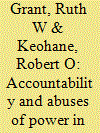

|
|
|
| 2 |
ID:
142887
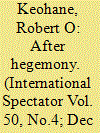

|
|
|
|
|
| Summary/Abstract |
The liberal international economic system established after the Second World War is currently in difficulty. Large fluctuations in exchange rates have led to calls for a “new Bretton Woods”. Protectionism has increased sharply on both sides of the Atlantic; the European Community, once a force for liberalization, now takes a leading role in imposing restrictions on trade. European and American discussions of the world economy are characterized less by thoughtful consideration of how joint action could relieve the current economic recession and reduce dangers of collapse, than by quarrelling over such issues as subsidies on pasta, alleged dumping of steel, and subsidized credit terms to the Soviet Union.
|
|
|
|
|
|
|
|
|
|
|
|
|
|
|
|
| 3 |
ID:
142888
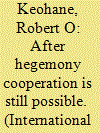

|
|
|
|
|
| Summary/Abstract |
This paper, which appeared in The International Spectator in January 1984, previewed many of the themes of my book, After Hegemony: Cooperation and Discord in the World Political Economy.1 I argued that the US had lost its hegemonic position in the world political economy: the ability to make and enforce the rules. Furthermore, its “egoism” would lead it to be less willing to invest in leadership or influence. Nevertheless, I argued, it was possible for cooperation to persist without hegemony – a major theme of my book, in response to others who argued that the collapse of American hegemony would usher in a new era of conflict.
|
|
|
|
|
|
|
|
|
|
|
|
|
|
|
|
| 4 |
ID:
106255
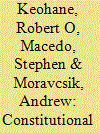

|
|
|
|
|
| Publication |
2011.
|
| Summary/Abstract |
According to our constitutional conception, modern democracy is multidimensional: it incorporates the values of faction control, minority rights protection, and informed deliberation, as well as political accountability. The impact of multilateral organizations (MLOs) on democracy is often not straightforward: it requires careful analysis of how particular MLOs interact with preexisting domestic political institutions within specific issue-areas. Thus we reject the conventional wisdom that MLOs are necessarily democracy-degrading simply because they are not directly participatory. Gartzke and Naoi's critique misstates our views on some fundamental issues. We clarify our analyses of the multidimensional nature of constitutional democracy; the relationship between democracy and multilateralism; the Madisonian distinction between interest groups that support the general interest and those that do not; and our understanding of the current state of research. We suggest possibilities for further elaborating our argument, theoretically and empirically.
|
|
|
|
|
|
|
|
|
|
|
|
|
|
|
|
| 5 |
ID:
088555
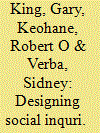

|
|
|
|
|
| Publication |
Princeton, Princeton University Press, 1994.
|
| Description |
247p.
|
| Standard Number |
9780691034713
|
|
|
|
|
|
|
|
|
|
|
|
Copies: C:1/I:1,R:0,Q:0
Circulation
| Accession# | Call# | Current Location | Status | Policy | Location | IssuedTo | DueOn |
| 054229 | 300.72/KIN 054229 | Main | Issued | General | | RA71 | 06-Mar-2024 |
|
|
|
|
| 6 |
ID:
112803
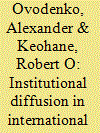

|
|
|
|
|
| Publication |
2012.
|
| Summary/Abstract |
This article explores institutional diffusion in international environmental governance, specifying the conditions under which an existing set of institutions provides a template for new institutions. Prior institutional experiences can help to resolve bargaining problems, reduce transaction costs and provide information about likely performance. The authors discuss five examples of institutional diffusion in international environmental affairs and outline some causal mechanisms and conditions that facilitate or block the diffusion of institutional characteristics. As a baseline analysis, founded on assumptions that abstract from politics, a functional argument is developed about the conditions under which mimetic diffusion, reflecting a pattern of imitation, can occur. Although the focus in this short article is on this functional argument, the authors recognize that state interests and power, ideology, and private interests also play significant roles in facilitating or inhibiting institutional diffusion in international environmental affairs.
|
|
|
|
|
|
|
|
|
|
|
|
|
|
|
|
| 7 |
ID:
037278


|
|
|
|
|
| Publication |
Boulder, Westview Press, 1989.
|
| Description |
ix, 270p.
|
| Standard Number |
0813308380
|
|
|
|
|
|
|
|
|
|
|
|
Copies: C:1/I:0,R:0,Q:0
Circulation
| Accession# | Call# | Current Location | Status | Policy | Location |
| 030859 | 327.0904/KEO 030859 | Main | On Shelf | General | |
|
|
|
|
| 8 |
ID:
152583
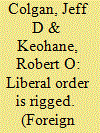

|
|
|
|
|
| Summary/Abstract |
Prior to 2016, debates about the global order mostly revolved around its structure and the question of whether the United States should actively lead it or should retrench, pulling back from its alliances and other commitments. But during the past year or two, it became clear that those debates had missed a key point: today’s crucial foreign policy challenges arise less from problems between countries than from domestic politics within them. That is one lesson of the sudden and surprising return of populism to Western countries, a trend that found its most powerful expression last year in the United Kingdom’s decision to leave the EU, or Brexit, and the election of Donald Trump as U.S. president.
|
|
|
|
|
|
|
|
|
|
|
|
|
|
|
|
| 9 |
ID:
147079
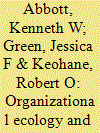

|
|
|
|
|
| Summary/Abstract |
The institutions of global governance have changed dramatically in recent years. New organizational forms—including informal institutions, transgovernmental networks, and private transnational regulatory organizations (PTROs)—have expanded rapidly, while the growth of formal intergovernmental organizations has slowed. Organizational ecology provides an insightful framework for understanding these changing patterns of growth. Organizational ecology is primarily a structural theory, emphasizing the influence of institutional environments, especially their organizational density and resource availability, on organizational behavior and viability. To demonstrate the explanatory value of organizational ecology, we analyze the proliferation of PTROs compared with the relative stasis of intergovernmental organizations (IGOs). Continued growth of IGOs is constrained by crowding in their dense institutional environment, but PTROs benefit from organizational flexibility and low entry costs, which allow them to enter “niches” with limited resource competition. We probe the plausibility of our analysis by examining contemporary climate governance.
|
|
|
|
|
|
|
|
|
|
|
|
|
|
|
|
| 10 |
ID:
092558
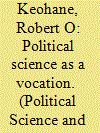

|
|
|
|
|
| Publication |
2009.
|
| Summary/Abstract |
This lecture was presented at the University of Sheffield on October 22, 2008, inaugurating the Graduate School of Politics; and at Oxford University on October 16, 2008. I have retained the lecture style for this publication, only making minor changes and additions in the text.
|
|
|
|
|
|
|
|
|
|
|
|
|
|
|
|
| 11 |
ID:
052276


|
|
|
|
|
| Edition |
3rd ed.
|
| Publication |
New York, Longman, 2001.
|
| Description |
xviii, 334p.
|
| Standard Number |
0321048571
|
|
|
|
|
|
|
|
|
|
|
|
Copies: C:1/I:0,R:0,Q:0
Circulation
| Accession# | Call# | Current Location | Status | Policy | Location |
| 044728 | 327/KEO 044728 | Main | On Shelf | General | |
|
|
|
|
| 12 |
ID:
105363


|
|
|
|
|
| Publication |
2011.
|
| Summary/Abstract |
There is no integrated regime governing efforts to limit the extent of climate change. Instead, there is a regime complex: a loosely-coupled set of specific regimes. We describe the regime complex for climate change and seek to explain it, using interest-based, functional, and organizational arguments. This institutional form is likely to persist; efforts to build a comprehensive regime are unlikely to succeed, but experiments abound with narrower institutions focused on particular aspects of the climate change problem. Building on this analysis, we argue that a climate change regime complex, if it meets specified criteria, has advantages over any politically feasible comprehensive regime. Adaptability and flexibility are particularly important in a setting-such as climate change policy-in which the most demanding international commitments are interdependent yet governments vary widely in their interest and ability to implement them. Yet in view of the serious political constraints, both domestic and international, there is little reason for optimism that the climate regime complex that is emerging will lead to reductions in emissions rapid enough to meet widely discussed goals, such as stopping global warming at two degrees above pre-industrial levels.
|
|
|
|
|
|
|
|
|
|
|
|
|
|
|
|
| 13 |
ID:
121036
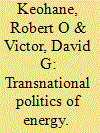

|
|
|
|
|
| Publication |
2013.
|
| Summary/Abstract |
Creating effective energy policy is hard, in part because it often requires effective international coordination. For most salient energy-related issues - such as control of the emissions that cause global climate change or the building of stockpiles to make oil supplies more secure - international coordination is inherently difficult. Solutions lie in making these problems more manageable by working in small groups of relevant countries; successful cooperation also hinges on finding incentive-compatible commitments that align, to the extent feasible, with national interests and are focused on areas where cooperation will yield tangible joint gains. The outcomes of such cooperation efforts are likely to be decentralized complexes of networked institutions rather than integrated, hierarchical treaties that govern a coherently defined issue-area.
|
|
|
|
|
|
|
|
|
|
|
|
|
|
|
|
| 14 |
ID:
113813


|
|
|
|
|
| Publication |
2012.
|
| Summary/Abstract |
The world has now experienced what could be regarded as 20 years of Institutional Liberalism: the dominance of the view that cooperation in world politics can be enhanced through the construction and support of multilateral institutions based on liberal principles. E. H. Carr was famously skeptical of liberalism as he understood that tradition. This essay, prepared originally as the E. H. Carr Lecture at Aberystwyth University, interrogates Institutional Liberalism through a lens provided by Carr's most famous book on international relations, The Twenty Years' Crisis. It points out three trends since the 1990s that may be associated with Institutional Liberalism: increasing legalization; trends toward more legalism and moralism; and a decline in the coherence of some international regimes. Reviewing these trends in light of Realist critiques of liberalism, the essay rejects Realism as a good moral or practical guide to world politics, but reaffirms the value of the Realist view that institutions depend on structures of power and interests. Increases in legalization, legalism and moralism reflect a fusion of the social purpose of liberal democracies with their unprecedented geopolitical power since 1991. But declines in the coherence of international regimes reflect a greater divergence of interests, weighted by power. All international institutions are flawed and in some ways precarious, but strengthening them in ways that reflect legitimate social purposes remains a major challenge for our time.
|
|
|
|
|
|
|
|
|
|
|
|
|
|
|
|
|
|
|
|
|